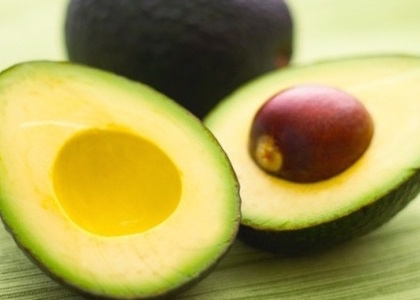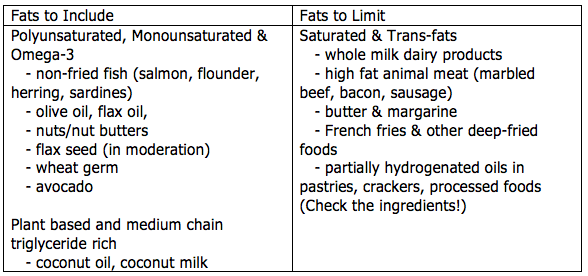
Good Fats vs. Bad Fats – The Facts
By Stacy Kennedy, MPH, RD, CSO, LDN; Reboot Nutritionist
Dietary fat is a hot topic full of conflicting information and controversy. What kinds of fat should I eat? How much fat? Will I get enough fat during my reboot? Here is a brief breakdown of the most important facts you need to know.
Why are fats important to eat?
Including healthy fats in the diet is important for many reasons here are just a few key points:
– Absorption of fat soluble vitamins and phytonutrients, like anti-oxidants Vitamin E and carotenes, Vitamin D and Vitamin K.
– Essential fats Omega-3 and Omega-6 which we need to eat (our bodies can’t create these vital nutrients from other foods). The typical western diet is full of Omega-6 fats but Omega-3s are less prevalent but very important for anti-inflammatory actions, healthy brain function and development and reduced risk for heart disease and preservation of muscle mass during cancer treatment just to name a few. Omega-3 fats are found in fish like salmon and sardines and plants like walnuts, pumpkin seeds, flax seeds and flax oil.
Does eating fat make you fat?
The short answer is no; wow! BUT the best answer is a bit longer – no, as long as you consume healthy fats in moderation. Fats contain more calories per gram (9) compared to carbohydrates and protein (4) or alcohol (7). A study from Brigham & Women’s hospital found placed 101 overweight men and women into 3 groups consuming the same number of calories:
– Group 1 was the control group and didn’t make any changes to their diet
– Group 2 ate a moderate fat diet from healthy foods, making up 35% of total calories
– Group 3 ate a low fat diet, making up 20% of total calories
Which group do you think lost the most weight?
If you guessed group 2, you are correct! The moderate fat group lost 6 pounds, the control group stayed the same and the low fat group actually gained 6 pounds. Since the calories were the same, another group of macronutrients needed to increase for the low fat group – to compensate for the decrease in calories from fat- they increased their intake of carbohydrate rich foods. This could had been why they gained weight, perhaps if they had eaten more vegetables or protein rich foods instead it would have led to different results – but the message of the study is that including some healthy fat may actually be helpful for maintaining a healthy weight. The general guidelines are to consume 20-30% of total calories from fats.
Can a high fat diet lead to cancer?
There is a limited-suggested increased risk of certain types of cancer in persons consuming larger amounts of total fat and animal fats; lung, colorectal and post-menopausal breast cancer, according to the American Institute for Cancer Research/World Cancer Research Fund 2007 report. There is much more evidence demonstrating that the type of fat you eat is important for overall health.
Several European studies have reported suggestive findings of lowered breast cancer risk among women with a higher intake of monounsaturated fats (olive and canola oil, nuts and nut butters, avocado) and omega 3 fats (oily, wild fish: salmon, sardines, herring, mackerel, bluefish; flax oil, walnuts). Choosing monounsaturated fats and omega-3 fatty acids has also been shown to be beneficial for heart health (decreasing risk of heart attacks), decreasing inflammation in the body, and improving immune function.
It is important to remember that overall dietary fat should still be limited to 25-30% of your daily calories. Choosing mono-and polyunsaturated fats in place of saturated fats is key. Saturated fats are animal fats, found in meats, full-fat dairy products, butter and poultry skin. Saturated fats raise total blood cholesterol levels as well as the bad cholesterol levels (LDL cholesterol). Hydrogenated oils, or trans-fats, are used in commercially prepared foods to prolong a products shelf life (margarines, chips, cookies, crackers, French fries, microwave popcorn). Trans-fats raise the bad LDL cholesterol and lower the good HDL cholesterol and are not recommended.
There has been one recent study that found a decrease in risk of recurrence of breast cancer for women who followed a 20% fat diet (versus the typical recommendation of 25-30%). This means that only 20% of their total calories came from fat. Interestingly, a greater effect was seen in women with Estrogen Receptor-negative (ER) breast cancer than those with ER-positive breast cancer. However, this decreased risk may be related to other factors like overall weight. These women lost weight, met with a nutritionist regularly and made other dietary changes that may have accounted for the benefits observed in this study.
Will I get enough fat in my diet during my Reboot?
The Reboot is generally very low in fat. For a short period of time this is not likely to be an issue for a healthy person. Some vegetables, like kale, contain healthy fat (2 cups = 1 gram) and for those eating and blending, avocado is a great source of fat during your Reboot.
If you are concerned about including more healthy fats during your reboot, follow this guide:
– Add extra virgin olive oil, flax oil, coconut oil or even a dash of coconut milk to your juice. Start with 1 tsp at a time per juice and increase this amount as desired.
– Add these healthy fats as dressings or in dips with your raw or cooked veggies and fruits.
Here are some tips for incorporating healthy fats into your diet after your Reboot:
– Add nuts (walnuts, almonds, peanuts, pistachios, etc.) to baked goods, breads, cereal, pancakes, salads, or yogurts. (1/4 cup serving = 170 calories)
– Trail mix or homemade granola bars with dried fruits and/or cranberries or raisins can be eaten as a snack or added to cereals and yogurts. (1/4 cup serving/bar = 120 calories)
– Olive, flax and coconut oil can be mixed into sauces, used as salad dressing. You can also use oil to cook when stir-frying or roasting vegetables. Flax oil is easily oxidized so best to use raw instead of cooking; olive oil is best cold or heated at low temperatures, and coconut oil is good for cooked meals and baking. (1 tbsp = 120 calories)
– Add natural nut butter (like peanut, almond, sunflower seed, cashew) as a spread to whole grain breads or eat it with fruits like bananas and apples for a healthy snack (2 tablespoons = 190 calories)
– Add bean spreads or hummus to vegetables (1/4 cup hummus/bean spread = 100 calories)
– Add avocado slices to sandwiches, smoothies or make a guacamole dip. (1/2 avocado = 150 calories)
Remember, unless you are trying to maintain or gain weight, these fats should be incorporated in place of other calories to avoid unwanted weight gain.
What are your thoughts on the dietary fat debate? We’d love to hear from you!
